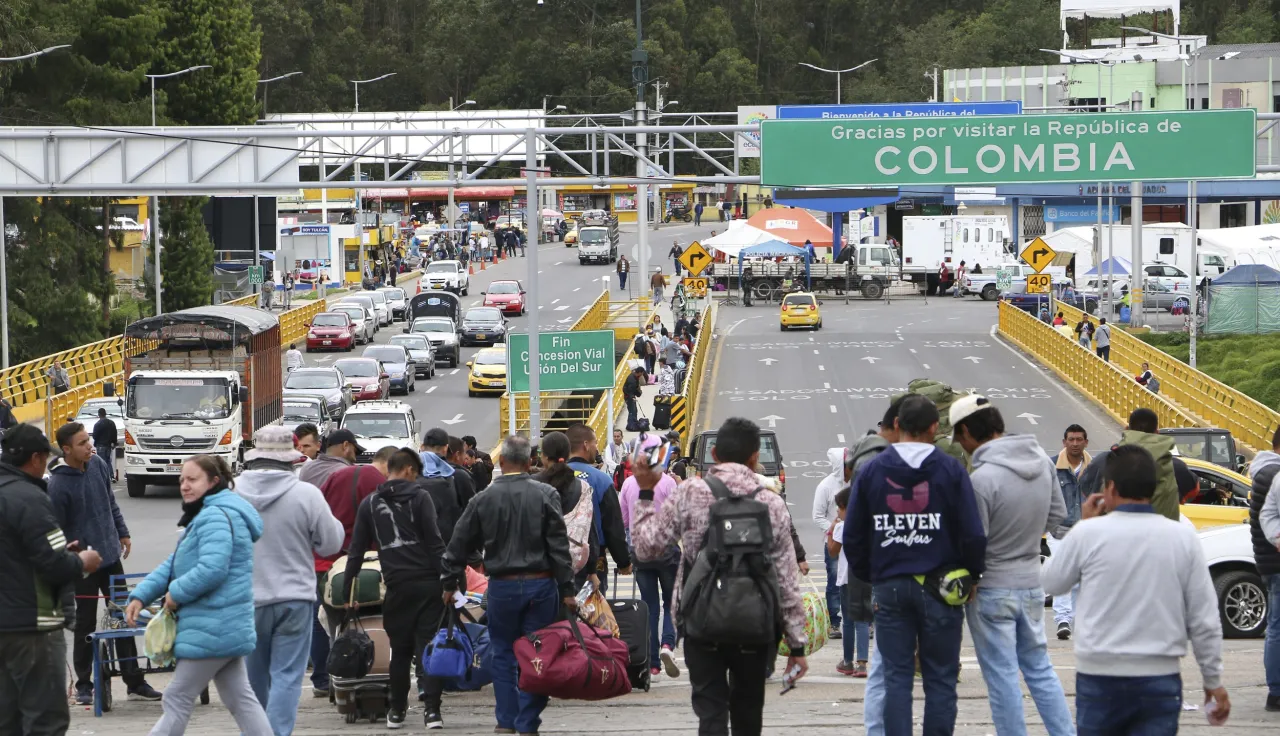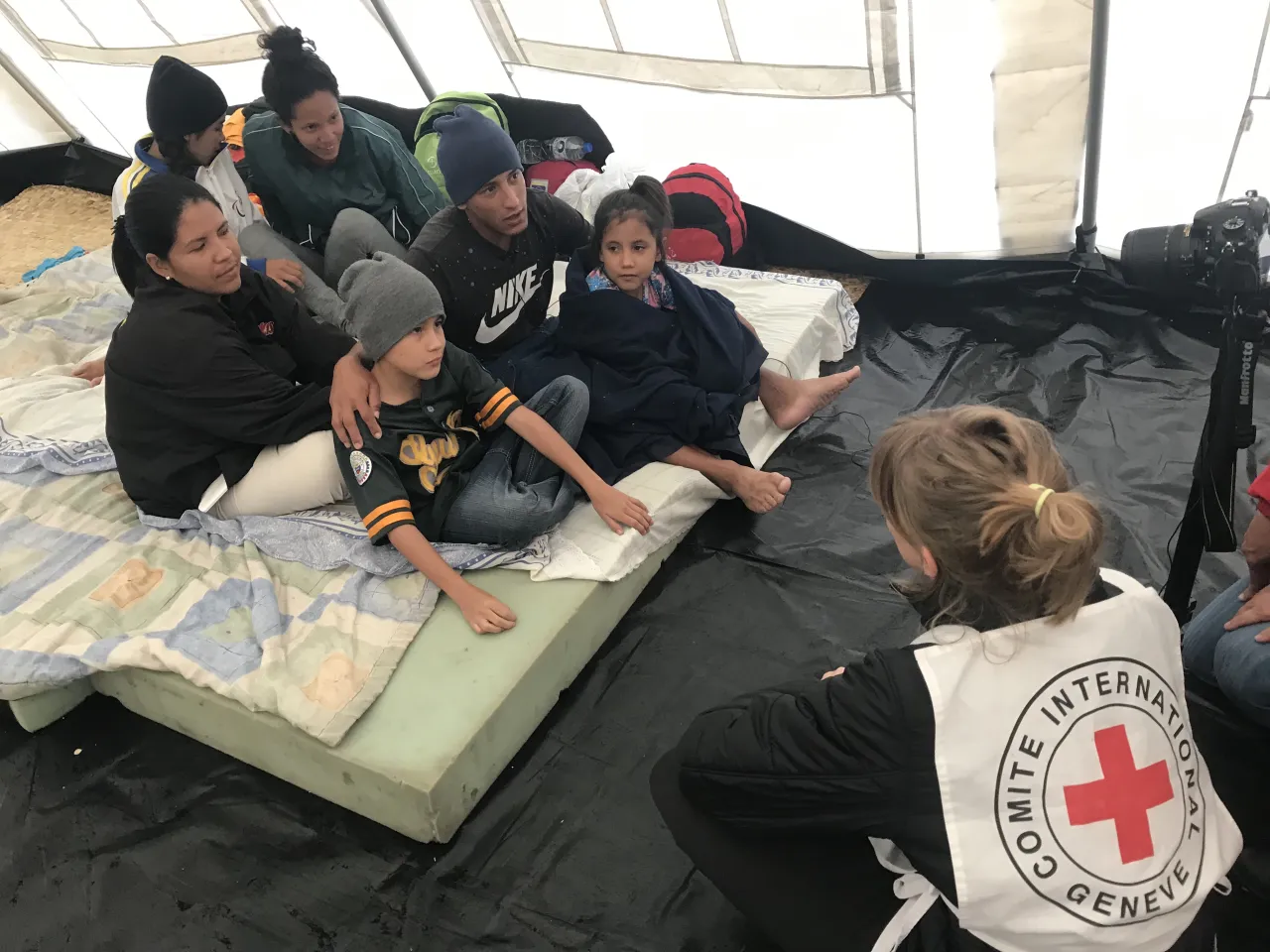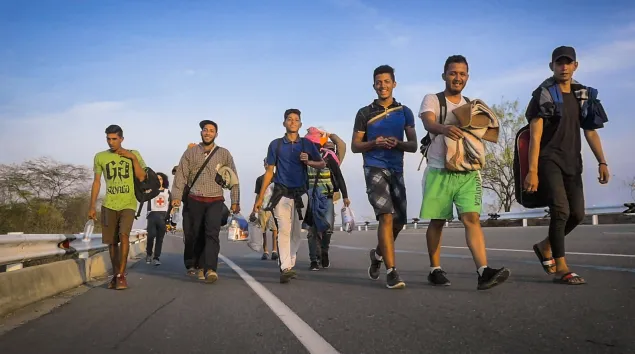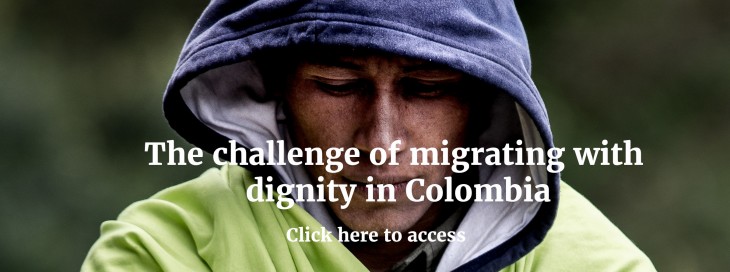Operational update on migration in South America: Danger, basic needs, family separation top concerns

An update from the ICRC on the conditions of migrants in Brazil, Colombia, Ecuador and Venezuela.
Venezuelans migrating into neighbouring countries often walk thousands of kilometers in search of better living conditions, means of survival or safety. Those who travel alone, the elderly, pregnant women and minors are the most vulnerable to extortion, threats, violence or forced recruitment by armed groups.
"The focus has been on migrant numbers, but our concern is how vulnerable they are. Many people, including children, arrive exhausted and hungry, shoes destroyed and feet bloodied. They face dangerously cold temperatures and have no choice but to sleep on the street, sometimes in the rain. Women tell us heartbreaking stories of violence," said Sophie Orr, the ICRC's regional director for the Americas.
"In Colombia, I talked to one family who left two of their children behind with grandparents and were extremely worried that they might not be able to send money home anytime soon," said Dominik Stillhart, the ICRC's director of operations. "This is real human trauma."
Humanitarian concerns:
- Migrants are exposed to many risks, especially in areas affected by armed conflict where they might be recruited by armed groups or forced to pay money for passage.
- Pregnant women sometimes leave their country of origin to give birth in decent conditions and at accessible costs abroad; but often, they wait until the last minute, taking the risk of giving birth on the road without any medical care and sometimes facing obstacles for obtaining documentation for their children born abroad.
- Women and girls are particularly vulnerable to sexual violence. "In a shelter for abused girls, there were three sisters, from six to 16 years of age. All of them were sexually abused at the border area," Stillhart said after a recent visit. "Their mother showed me the testimony of a seven-year-old girl and I could barely stand reading it."
- Some people lose contact with their relatives; others are separated on the road. Children are left behind under the care of elderly family members, or left in a vulnerable situation.
- The fact that many migrants do not have documents creates greater difficulties for safety and access to basic rights and services such as education or health.
Operational response:
- Between October 2018 and January 2019, the Red Cross* helped almost 126,000 migrants reestablished contact with their families: almost 71,000 were provided in Brazil; 4,500 in Colombia; 35,500 in Ecuador; 14,700 in Peru and 104 in Venezuela.
- Additionally, in Colombia, the Red Cross family* helped 124,500 migrants with health, food, sanitation and education.
Support included:
- Distributions of bottled water to more than 83,000 migrants and installation of 7 drinking water points that helped about 9,000 people a day.
- Donations of housing/ hygiene items in two shelters; rehabilitation/ support to 3three shelters.
- Donation of medicines to three hospitals in border areas; financial assistance for medical services to 95 vulnerable migrants; physical rehabilitation services for 80 migrants with disabilities, and psychosocial support to 307 migrants.
- Food parcels delivered to 15,000 migrants in 26 municipalities
- In Venezuela, support was provided to two safe homes for abandoned children in the border areas with Colombia; 17 migrant human remains were repatriated from Brazil, Colombia, Curacao, Ecuador, Peru, and three children were reunified with their families. Overall, almost 1,900 migrants benefited from the ICRC´s support in Venezuela, including access to connectivity and information, hydration and first-aid.
- In Ecuador, the ICRC installed water purification systems, showers, toilets and washbasins at crossings on the Colombia border. It also supported the rehabilitation and improvement of three temporary reception centers and the construction of ten modules to accommodate migrant families. Also, more than 3,000 hygiene kits, 800 caps and 2,000 blankets were given to migrants passing through Ecuador, and relevant information was provided to migrants passing through Ecuador and Peru.
- In response to xenophobic outbreaks in Ecuador, the ICRC and the Ecuadorian Red Cross passed on tolerance messages through street theatre. In Peru, the campaign #WeAreAllMigrants did the same in the public transport system.
- In Brazil, two wells were built at the Diocese and at the Pacaraima State Hospital, benefiting 2,000 migrants and local residents.
(*Red Cross family = ICRC, International Federation of the Red Cross, and Red Cross National Societies)
For further information, please contact:
Brazil: Sandra Lefcovich, +9 55 619 8175 15 99
Colombia: Isabel Ortigosa Barbero, +57 311 491 07 89
Ecuador: Alicia Dafne Martos, +51 997 560 240
Venezuela: María Cecilia Goin, + 58 424 137 23 75
Geneva: Patricia Rey González, +41 79 218 76 10



